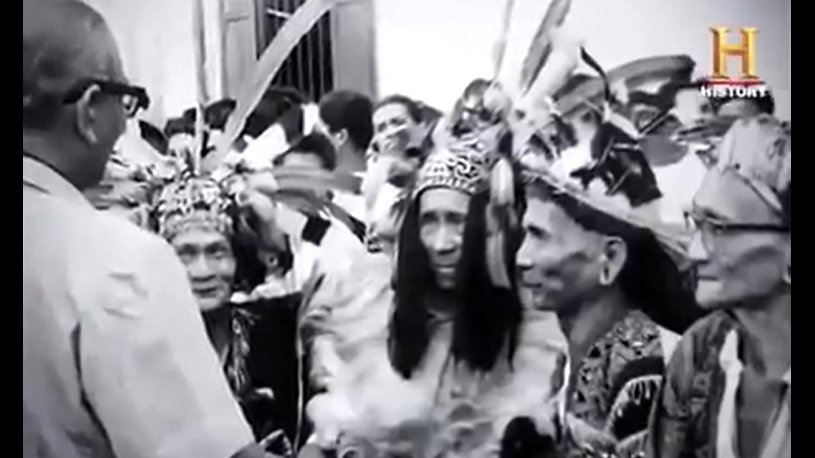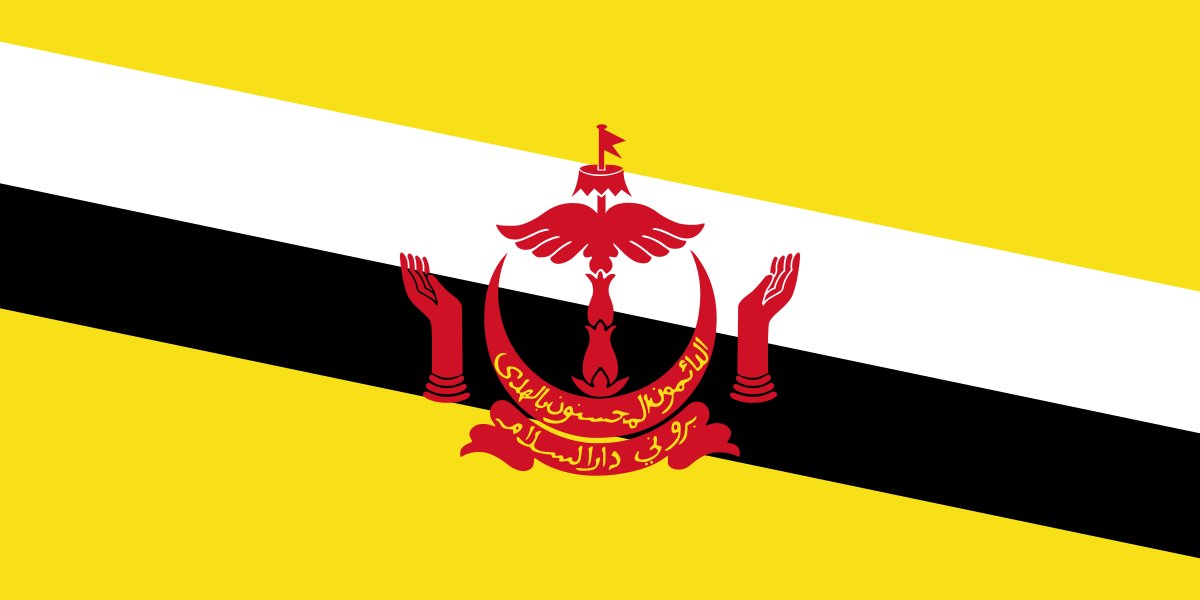The History of the formation of Malaysia https://abs.twimg.com/emoji/v2/... draggable="false" alt="🇲🇾" title="Flagge von Malaysia" aria-label="Emoji: Flagge von Malaysia"> that is not taught in detail in our history syllabus:
https://abs.twimg.com/emoji/v2/... draggable="false" alt="🇲🇾" title="Flagge von Malaysia" aria-label="Emoji: Flagge von Malaysia"> that is not taught in detail in our history syllabus:
North Borneo (Sabah) and Sarawak were reluctant and skeptical about forming Malaysia with Malaya and Singapore.
Tunku Abdul Rahman went to Borneo for the first time to see the
North Borneo (Sabah) and Sarawak were reluctant and skeptical about forming Malaysia with Malaya and Singapore.
Tunku Abdul Rahman went to Borneo for the first time to see the
situation in Sabah and Sarawak.
After the trip to the Borneo States, he saw for himself how different Sabah and Sarawak are compared to Malaya.
He initially thought the people of Borneo are like the Malays in Malaya. Well.... he was wrong.
Tunku however was adamant that
After the trip to the Borneo States, he saw for himself how different Sabah and Sarawak are compared to Malaya.
He initially thought the people of Borneo are like the Malays in Malaya. Well.... he was wrong.
Tunku however was adamant that
the Borneo leaders must agree to the formation of Malaysia.
He refused to have only Malaya and Singapore in the Federation of Malaysia.
Tunku then extended an invitation to the Borneo leaders to Malaya.
The objective of the invitation was so the Borneo leaders could obtain a
He refused to have only Malaya and Singapore in the Federation of Malaysia.
Tunku then extended an invitation to the Borneo leaders to Malaya.
The objective of the invitation was so the Borneo leaders could obtain a
a firsthand idea of what Malaysian plan would mean for their respective COUNTRIES.
The Tunku explained that Malaysia would hasten their independence and bring about untold benefits to their countries as well.
To further convince the Borneo leaders, Tunku had Tun Abdul Razak
The Tunku explained that Malaysia would hasten their independence and bring about untold benefits to their countries as well.
To further convince the Borneo leaders, Tunku had Tun Abdul Razak
to show them the development progress in Malaya since its independence.
They were brought to tour around the capital city (KL) and they were told that the Borneo States too can be as developed as Malaya if they agree to form Malaysia!!
They were brought to tour around the capital city (KL) and they were told that the Borneo States too can be as developed as Malaya if they agree to form Malaysia!!
Naturally, the Borneo leaders were excited and impressed with the assurance given by Tunku and Tun Abdul Razak.
A Sabah representative, Abdul Ghani Gilong (UPKO) even said this to the delegates after being shown all the new roads, schools, electric and water supplies:
A Sabah representative, Abdul Ghani Gilong (UPKO) even said this to the delegates after being shown all the new roads, schools, electric and water supplies:
"Besok pun saya bersedia masuk Malaysia!"
-Abdul Ghani Gilong.
The visit then led to the formation of the Malaysia Solidarity Consultative Committee (MSCC) to formally discuss the formation of Malaysia.
MSCC comprised of legislative members of Malaya, Singapore, Sarawak,Brunei
-Abdul Ghani Gilong.
The visit then led to the formation of the Malaysia Solidarity Consultative Committee (MSCC) to formally discuss the formation of Malaysia.
MSCC comprised of legislative members of Malaya, Singapore, Sarawak,Brunei
and North Borneo.
Suprisingly, the committee appointed Donald Stephen (North Borneo) as chairman of the committee.
Donald Stephen was reluctant and skeptical of the idea of Malaysia.
He argued that the natives of Borneo are not prepared for the idea.
Suprisingly, the committee appointed Donald Stephen (North Borneo) as chairman of the committee.
Donald Stephen was reluctant and skeptical of the idea of Malaysia.
He argued that the natives of Borneo are not prepared for the idea.
He even told the people of Sabah that "forces are at work to wreck us all" (forces here refers to Malaya and SG.)
He opposed Malaysia alongside Parti Rakyat Brunei and Sarawak United Peoples Party (SUPP).
Nevertheless, he agreed to chair the committee.
He opposed Malaysia alongside Parti Rakyat Brunei and Sarawak United Peoples Party (SUPP).
Nevertheless, he agreed to chair the committee.
The Cobbold Commission was then formed by the British Gov listen to the concerns of the people of Borneo on the formation of Malaysia.
The Commission reported on Aug 1, 1962 that the people of the Borneo States wished to join Malaya.
The Commission reported on Aug 1, 1962 that the people of the Borneo States wished to join Malaya.
Inter-Governmental Committee was formed in 1962.
The Committee worked out the provisions to safeguard the special interests of North Borneo and Sarawak.
A number of issues were agreed on by the committee, including Sabah and Sarawak& #39;s autonomy over immigration.
General elections were held in North Borneo in
A number of issues were agreed on by the committee, including Sabah and Sarawak& #39;s autonomy over immigration.
General elections were held in North Borneo in
December 1962 and in Sarawak in 1963 prior to the formation of Malaysia to get the people of Borneo& #39;s mandate.
However, The Philippines and Indonesia opposed the formation of the new federation and rejected the legitimacy of the self-determination process.
However, The Philippines and Indonesia opposed the formation of the new federation and rejected the legitimacy of the self-determination process.
They claimed Malaysia is a new form neo-colonialism.
Tunku tried to persuade and convince the two nations that Malaysia is not what they claim to be.
It was agreed to invite the United Nations Secretary-General to ascertain the wishes of the people of Sabah and Sarawak & to
Tunku tried to persuade and convince the two nations that Malaysia is not what they claim to be.
It was agreed to invite the United Nations Secretary-General to ascertain the wishes of the people of Sabah and Sarawak & to
determine the democratic legitimacy of the electoral processes in North Borneo and Sarawak.
The UN Secretary-General’s mission spent 3 weeks in Borneo to conduct a survey. It reported on Sept 15,1963 that the Malaysia proposal had the wide backing of the people of both States.
The UN Secretary-General’s mission spent 3 weeks in Borneo to conduct a survey. It reported on Sept 15,1963 that the Malaysia proposal had the wide backing of the people of both States.
However, some questioned the legitimacy of the survey as they claimed the mission had only inquired approximately 4 thousand Sabahans and Sarawakians which was not even a quarter of the total population of both States.
The Indonesian and Philippines Governments were not persuaded. Indonesia resorted to an undeclared war (the “Confrontation”) with Malaysia.
The conflict lasted nearly four years; however, following General Suharto& #39;s replacement of Sukarno, Indonesian interest in pursuing the war with Malaysia declined, and combat eased. Peace negotiations were initiated during May 1966 before a final peace agreement was ratified on
11 August 1966.
And so on Sept 16, 1963, a new country named Malaysia was born. A proclamation of Malaysia was made in Malaya, Singapore, Sarawak and North Borneo.
https://twitter.com/AymanRashdanW/status/1305818891101167616?s=20">https://twitter.com/AymanRash...
And so on Sept 16, 1963, a new country named Malaysia was born. A proclamation of Malaysia was made in Malaya, Singapore, Sarawak and North Borneo.
https://twitter.com/AymanRashdanW/status/1305818891101167616?s=20">https://twitter.com/AymanRash...
57 years have passed since the formation of Malaysia. Today, we still see a huge disparity in terms of development between Malaya & the Borneo States.
Many still do not have access to roads, clean water & electricity in Sabah & Sarawak.
We have seen many of Sabah & Sarawak& #39;s
Many still do not have access to roads, clean water & electricity in Sabah & Sarawak.
We have seen many of Sabah & Sarawak& #39;s
rights, agreed in MA63 & the IGC Report eroded.
We have seen Sabah and Sarawak not being treated as equal partners.
Temenggong Jugah anak Barieng, one of Sarawak& #39;s leader who represented Sarawak in the discussions of the formation of Malaysia once said this:
We have seen Sabah and Sarawak not being treated as equal partners.
Temenggong Jugah anak Barieng, one of Sarawak& #39;s leader who represented Sarawak in the discussions of the formation of Malaysia once said this:
‘Anang Malaysia baka tebu, manis dipun tabar di hujung’
which means ‘Jangan Malaysia seperti tebu, manis di pangkal tawar di hujung’
Now let us ask ourselves, is this not happening right now?
We were promised developement.
We were promised equal partnership status.
which means ‘Jangan Malaysia seperti tebu, manis di pangkal tawar di hujung’
Now let us ask ourselves, is this not happening right now?
We were promised developement.
We were promised equal partnership status.
We were promised economic prosperity.
But in reality...?
I wish for all Malaysians to embrace the true spirit of the formation of Malaysia. We can all play our parts by educating ourselves.
Happy 57th birthday, Malaysia https://abs.twimg.com/emoji/v2/... draggable="false" alt="🇲🇾" title="Flagge von Malaysia" aria-label="Emoji: Flagge von Malaysia">
https://abs.twimg.com/emoji/v2/... draggable="false" alt="🇲🇾" title="Flagge von Malaysia" aria-label="Emoji: Flagge von Malaysia">
#MalaysiaDay
But in reality...?
I wish for all Malaysians to embrace the true spirit of the formation of Malaysia. We can all play our parts by educating ourselves.
Happy 57th birthday, Malaysia
#MalaysiaDay
Here& #39;s another interesting fact: https://twitter.com/tijanishere/status/1306508697288339456?s=20">https://twitter.com/tijanishe...

 Read on Twitter
Read on Twitter that is not taught in detail in our history syllabus: North Borneo (Sabah) and Sarawak were reluctant and skeptical about forming Malaysia with Malaya and Singapore.Tunku Abdul Rahman went to Borneo for the first time to see the" title="The History of the formation of Malaysiahttps://abs.twimg.com/emoji/v2/... draggable="false" alt="🇲🇾" title="Flagge von Malaysia" aria-label="Emoji: Flagge von Malaysia"> that is not taught in detail in our history syllabus: North Borneo (Sabah) and Sarawak were reluctant and skeptical about forming Malaysia with Malaya and Singapore.Tunku Abdul Rahman went to Borneo for the first time to see the" class="img-responsive" style="max-width:100%;"/>
that is not taught in detail in our history syllabus: North Borneo (Sabah) and Sarawak were reluctant and skeptical about forming Malaysia with Malaya and Singapore.Tunku Abdul Rahman went to Borneo for the first time to see the" title="The History of the formation of Malaysiahttps://abs.twimg.com/emoji/v2/... draggable="false" alt="🇲🇾" title="Flagge von Malaysia" aria-label="Emoji: Flagge von Malaysia"> that is not taught in detail in our history syllabus: North Borneo (Sabah) and Sarawak were reluctant and skeptical about forming Malaysia with Malaya and Singapore.Tunku Abdul Rahman went to Borneo for the first time to see the" class="img-responsive" style="max-width:100%;"/>













